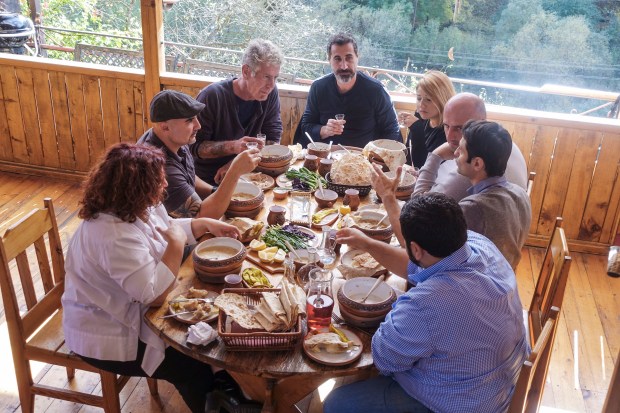For years there’s been a steady drumbeat of inquiries from Armenian-American fans of the show: “When will you visit Armenia?” “Why haven’t you been to my country?”
They were very legitimate and increasingly troublesome questions. I wanted to go. I had every intention of going. But I had yet to figure out how or—more accurately—through whose eyes, through what perspective I’d look at this very old and very complicated country.
Then, out of the blue, Serj Tankian, the lead singer of the band System of a Down reached out, and I had my answer. Serj, like so many Armenian-Americans, has been trying to reconnect with his roots. His personal history, like the histories of many people who identify as Armenian, is with the diaspora—those who escaped or were pushed out by what can and should only be called a genocide. It should be noted that Turkey continues to deny a genocide ever took place.
But I have no problem using that word. I am both proud to use it and baffled by the world’s continued reluctance to call the Turks’ carefully planned and executed murder in 1915 of an estimated 1.5 million ethnic Armenians—and the displacement of millions more—anything but what it was.
Those horrendous events and Turkey’s refusal to acknowledge them remain central to any discussion of Armenia—a fundamental, unifying factor in defining what it means to be Armenian.
Armenia finds itself situated in a tricky piece of real estate. It borders adversaries Turkey and Azerbaijan and has a complicated, if close, relationship with nearby Russia. Approximately 80 percent of its borders are closed.
It is unlikely I will be welcome in Turkey after this show. Because I filmed in the disputed territory of Artsakh, I was informed that I have been PNG’d (declared officially “persona non grata”) in Azerbaijan.
The connection, the collective yearning, and the flow of money, resources, and people from the Armenian diaspora back into the homeland are powerful and important—as you will see. They are also vital to the nation’s survival. An astonishing amount of money is returning home from abroad—for schools, hospitals, and institutions—to help the country grow. And an ever larger number of overseas Armenians are returning, to see where they came from, to enjoy the food, and to reconnect—if they still can—with family, tradition, a way of life.
Serj Tankian is one such story. I’m grateful to him for sharing it with me.
Highlights from Armenia on Explore Parts Unknown:
- What is Armenian food like? Depends who you ask.
- Nagorno-Karabakh: a photo essay on a territory in limbo
- Armenia’s “Velvet Revolution”: an interview with Richard Giragosian
- A recipe for lahmoujan meat pies
- A history of Ararat, Armenia’s famed brandy
